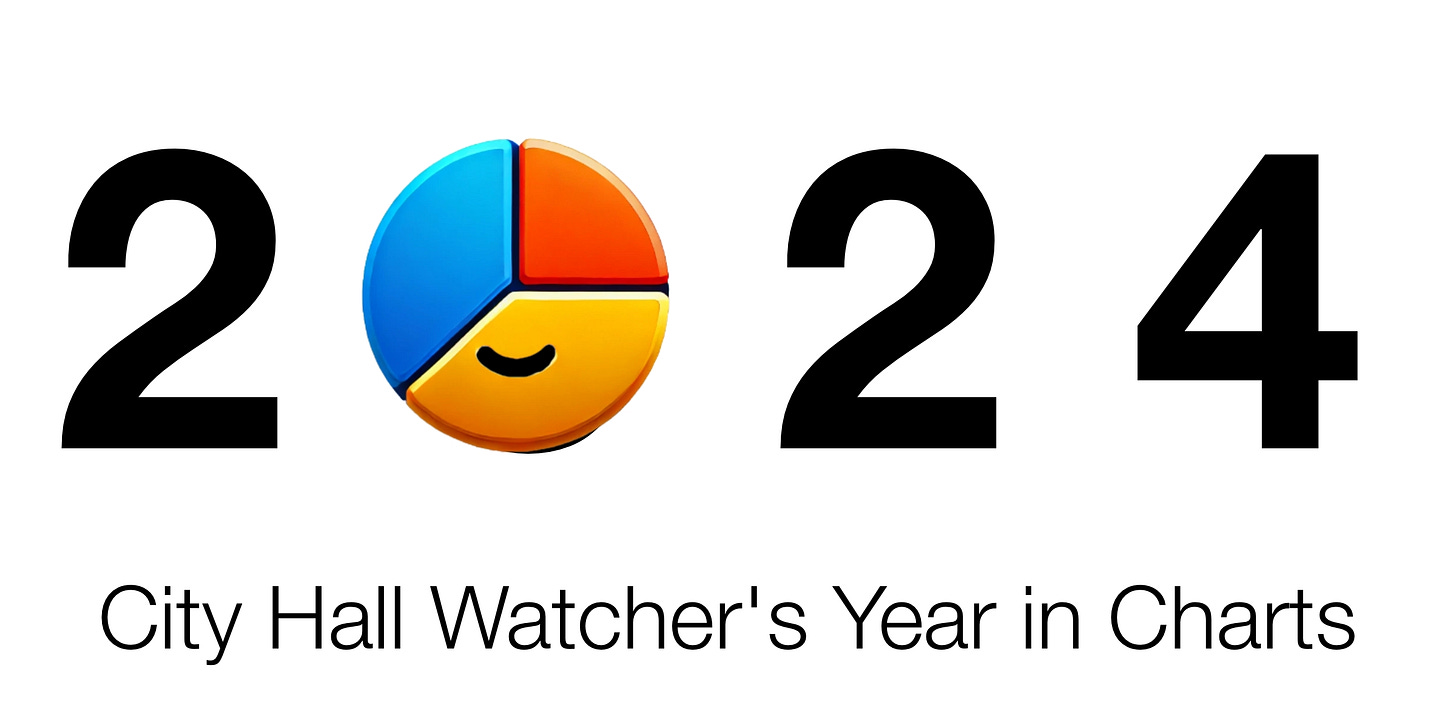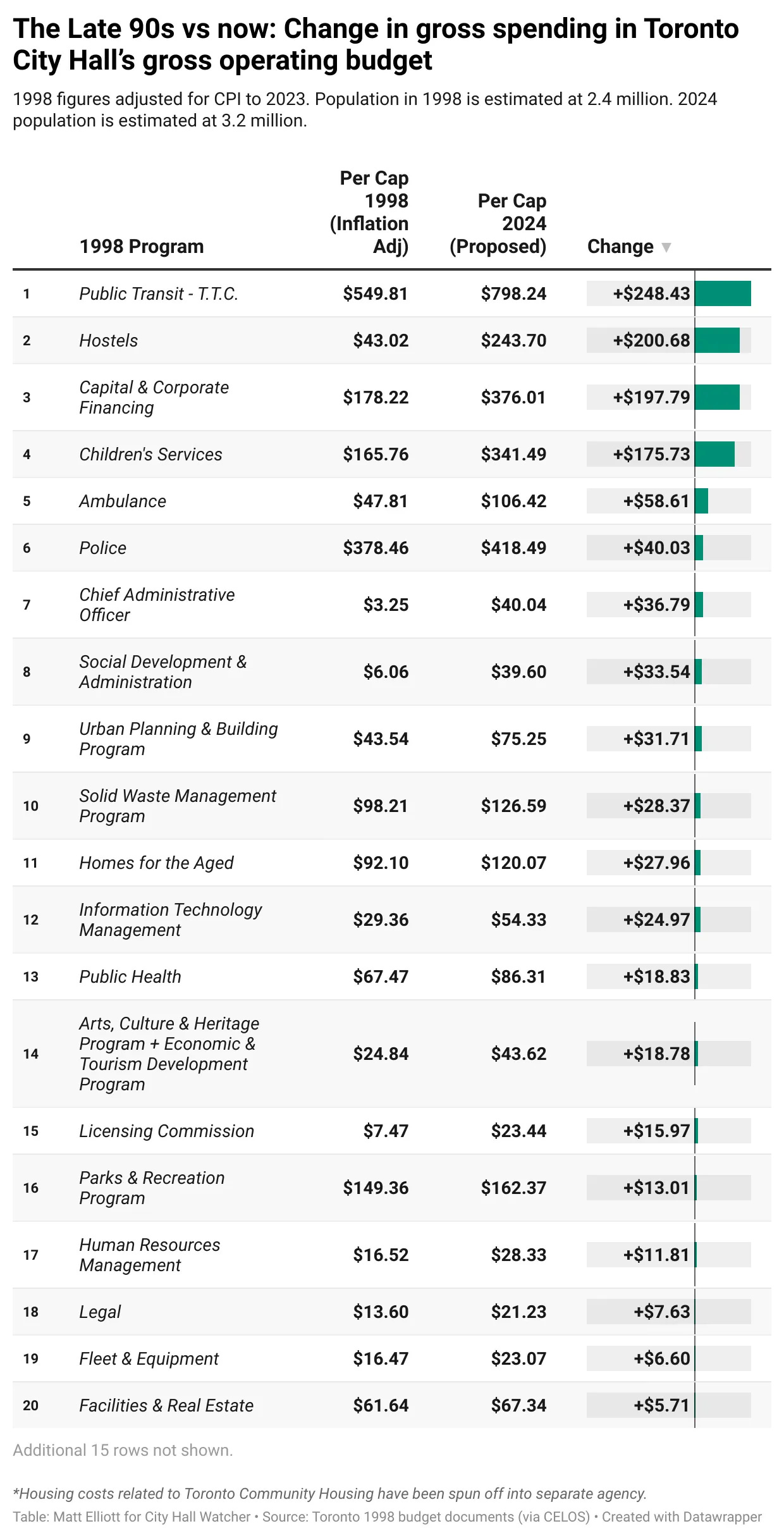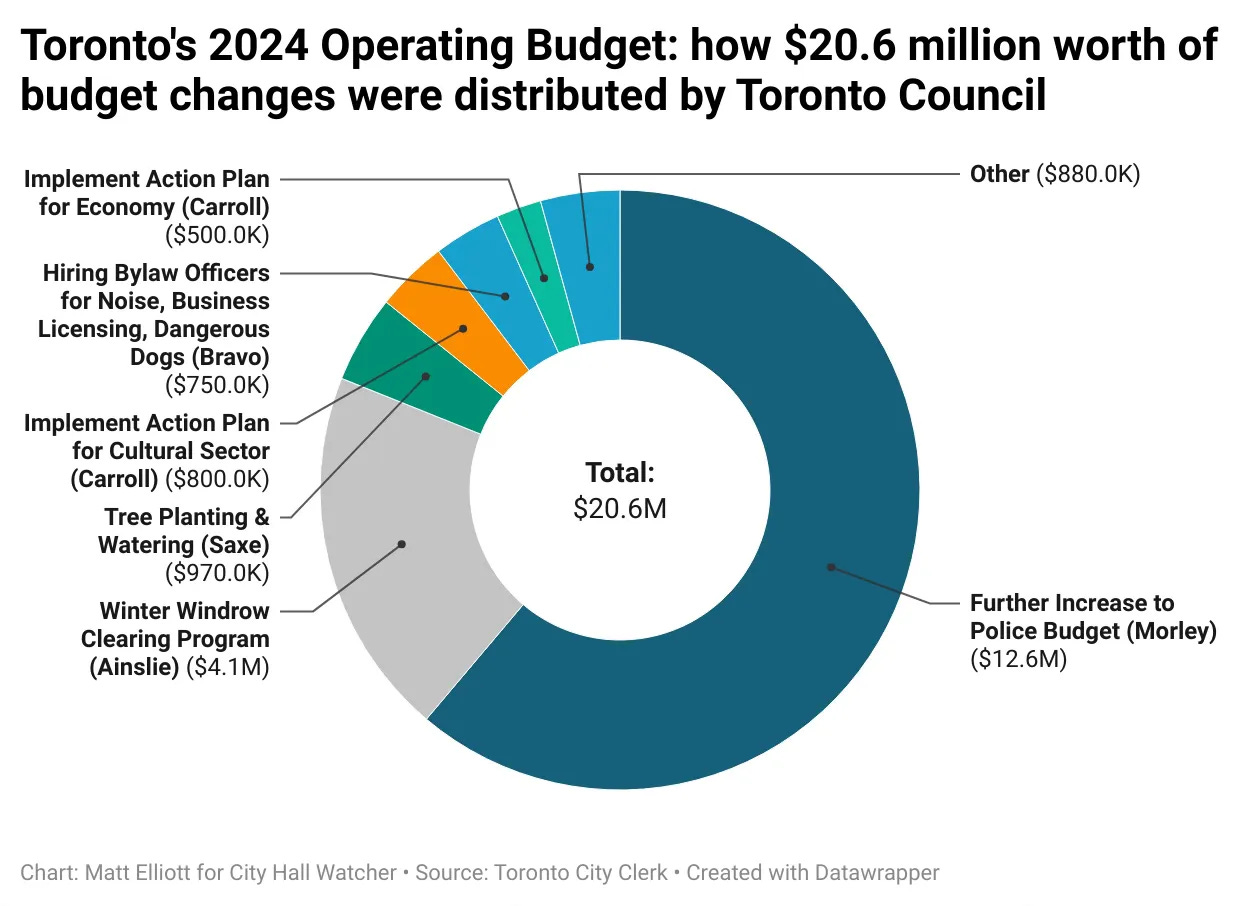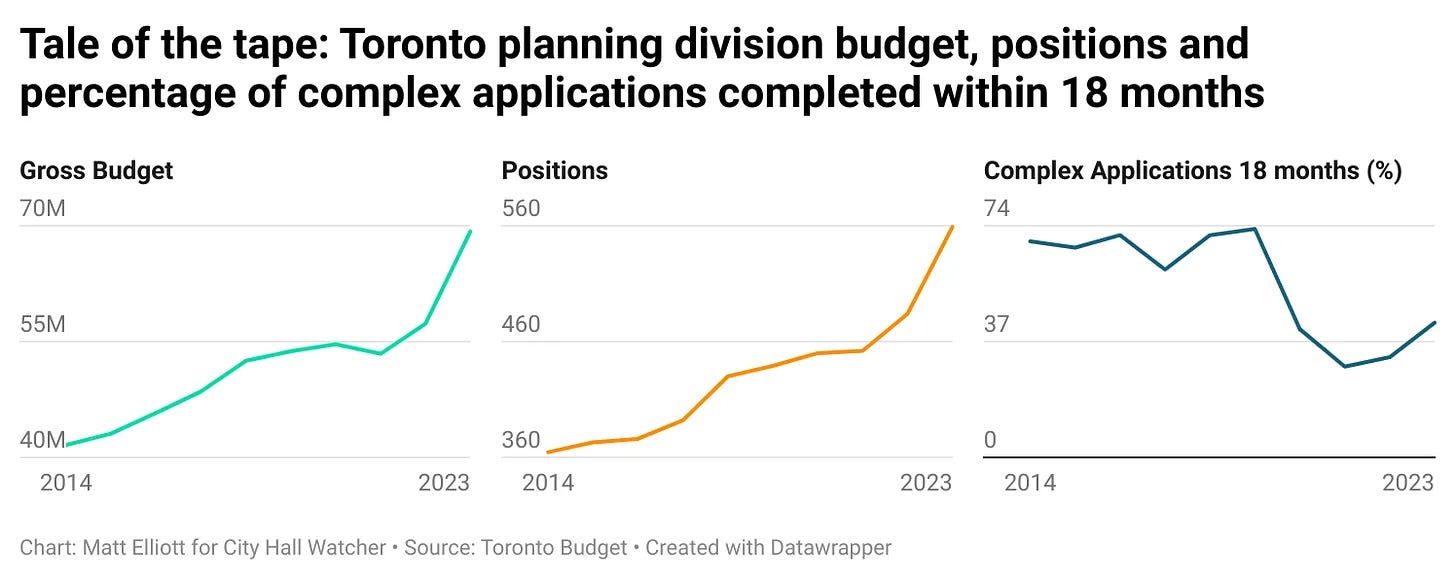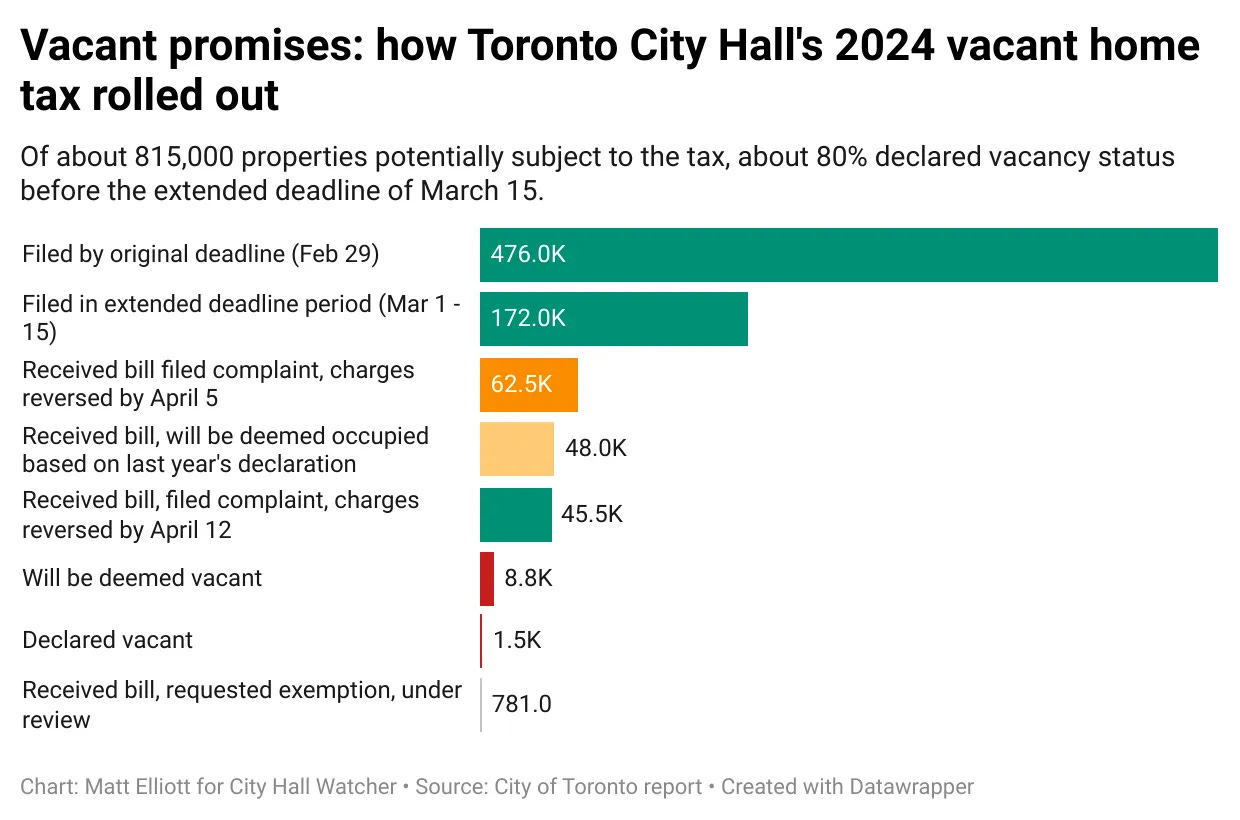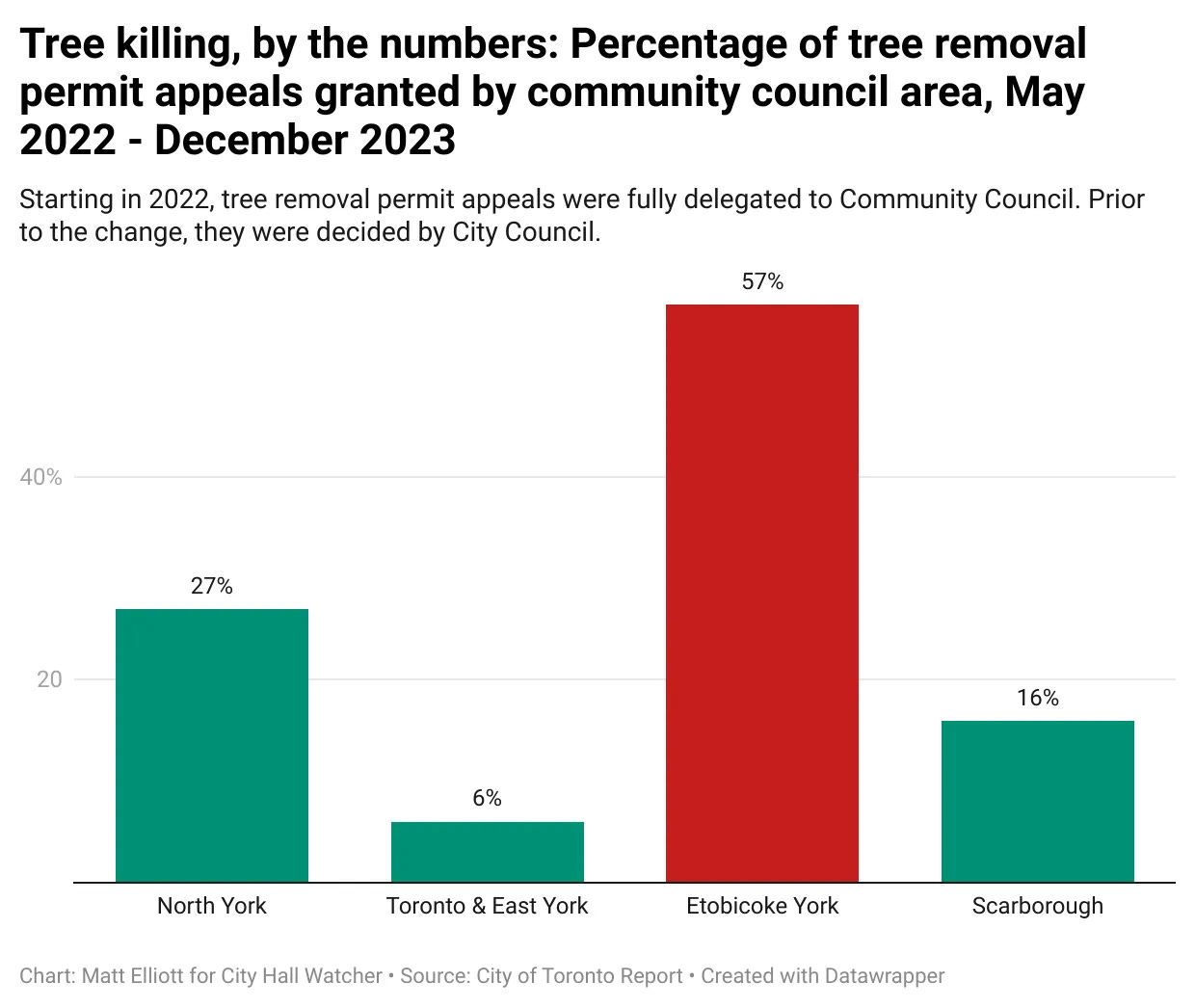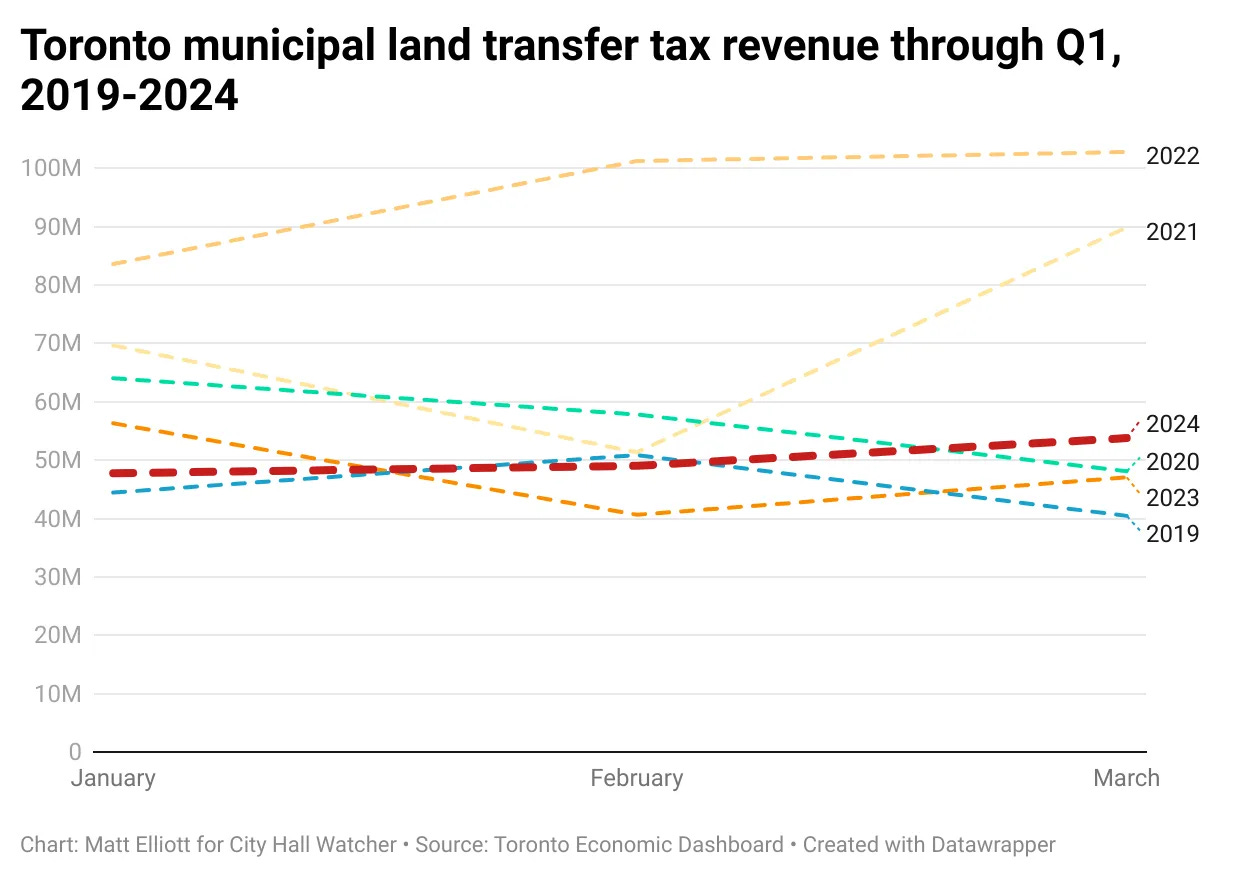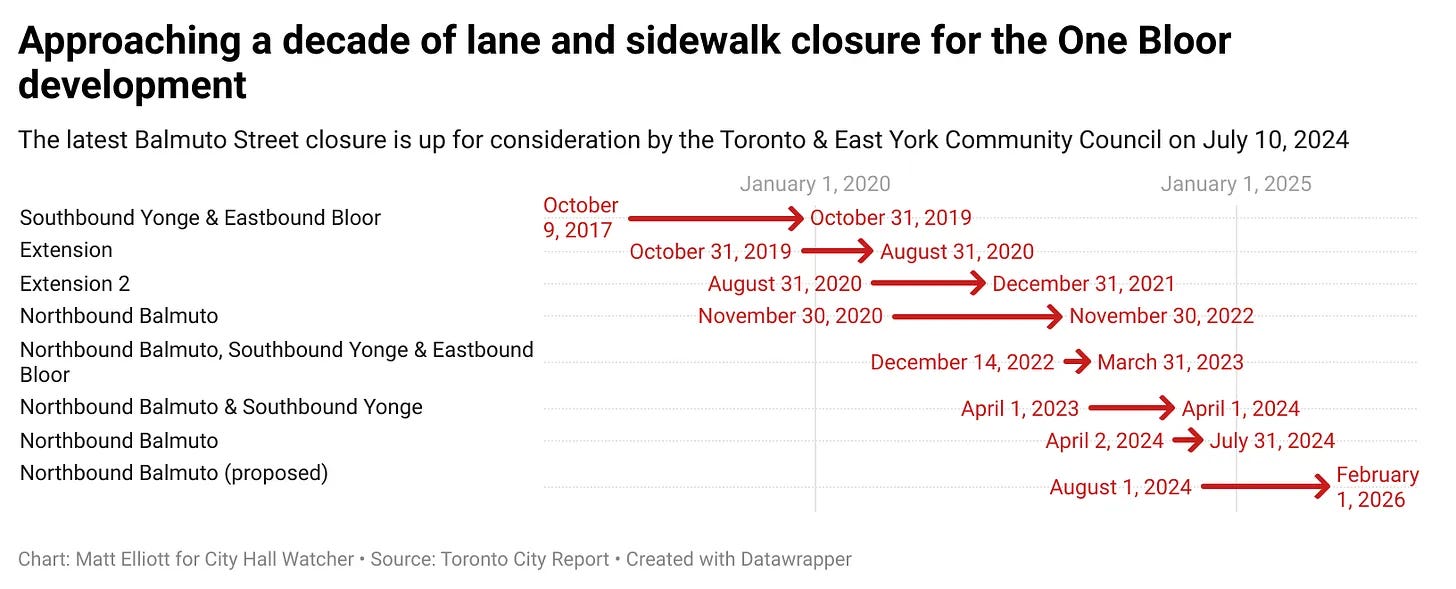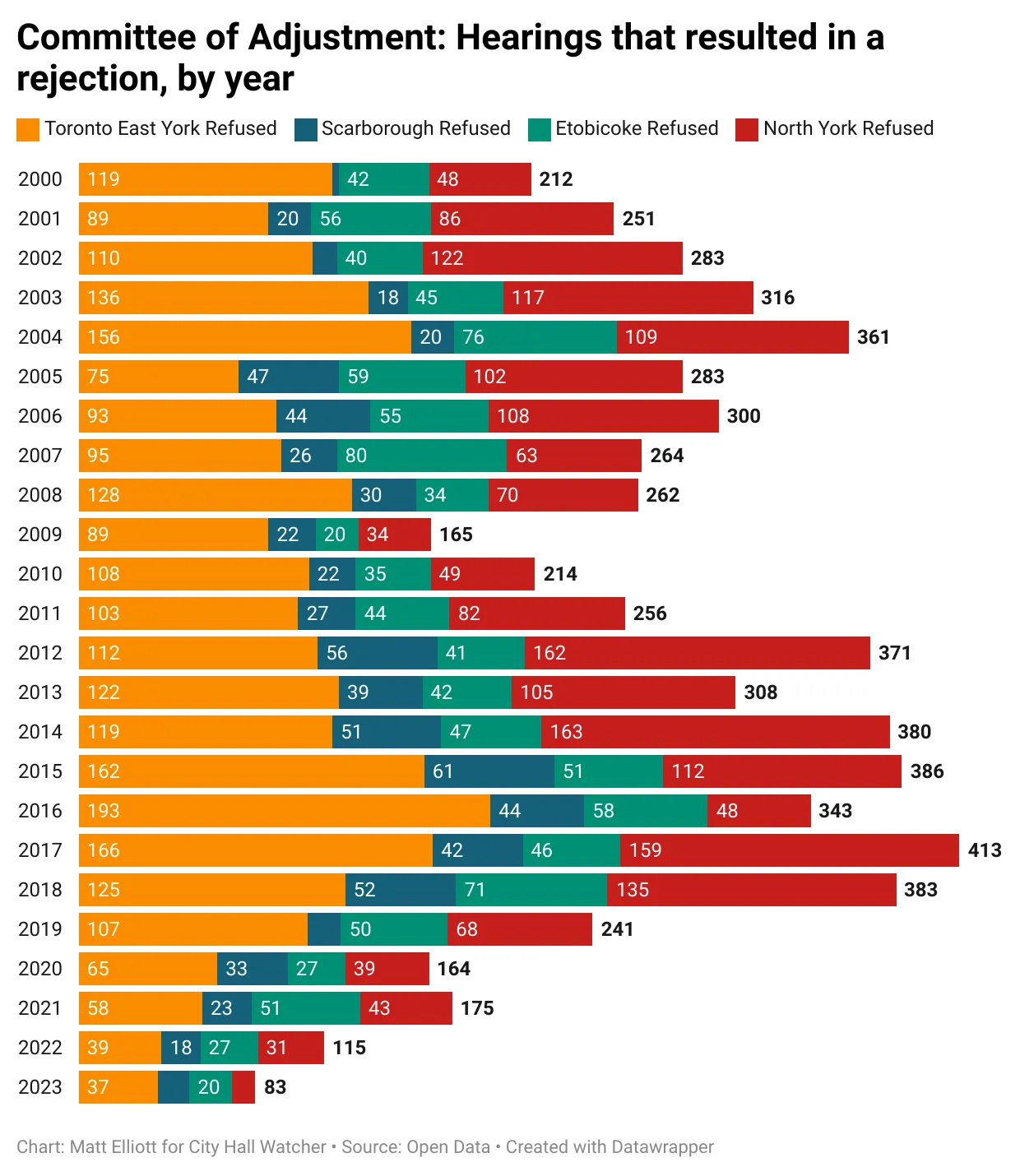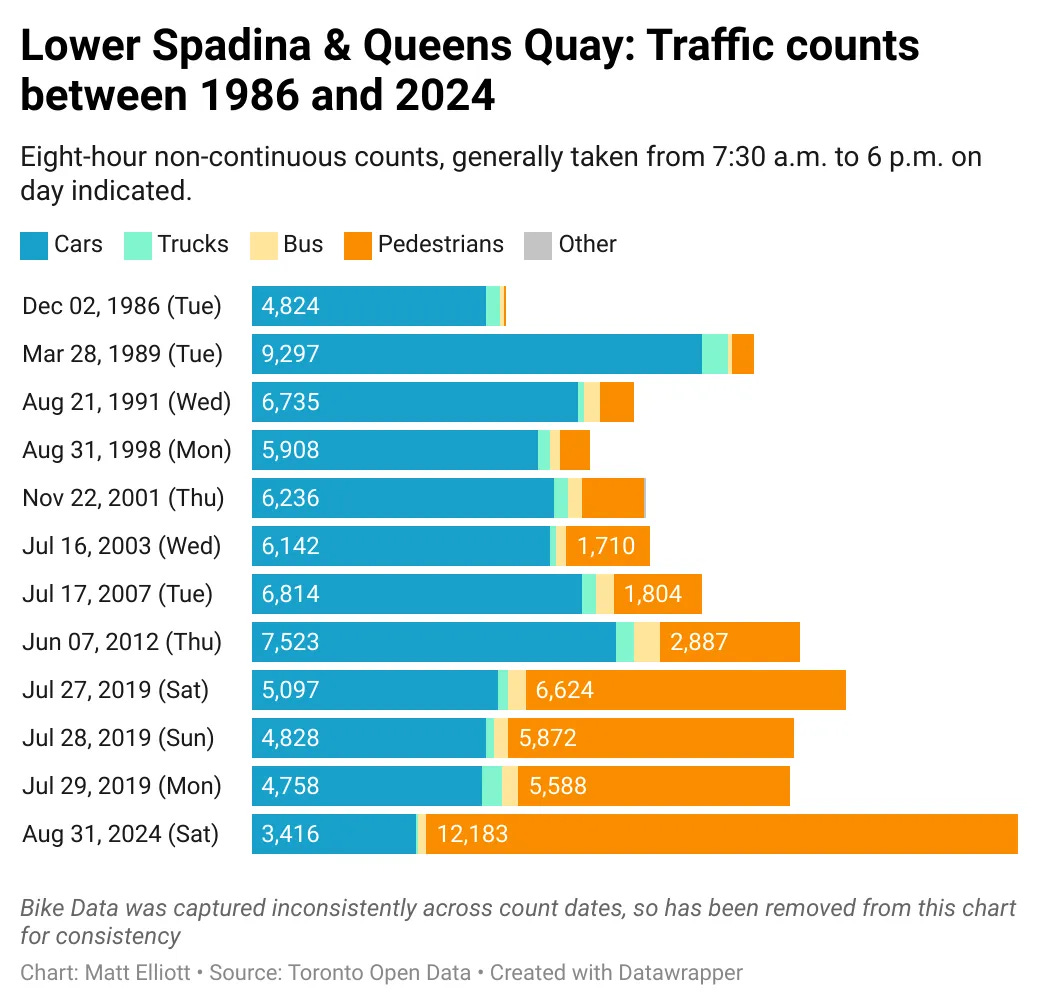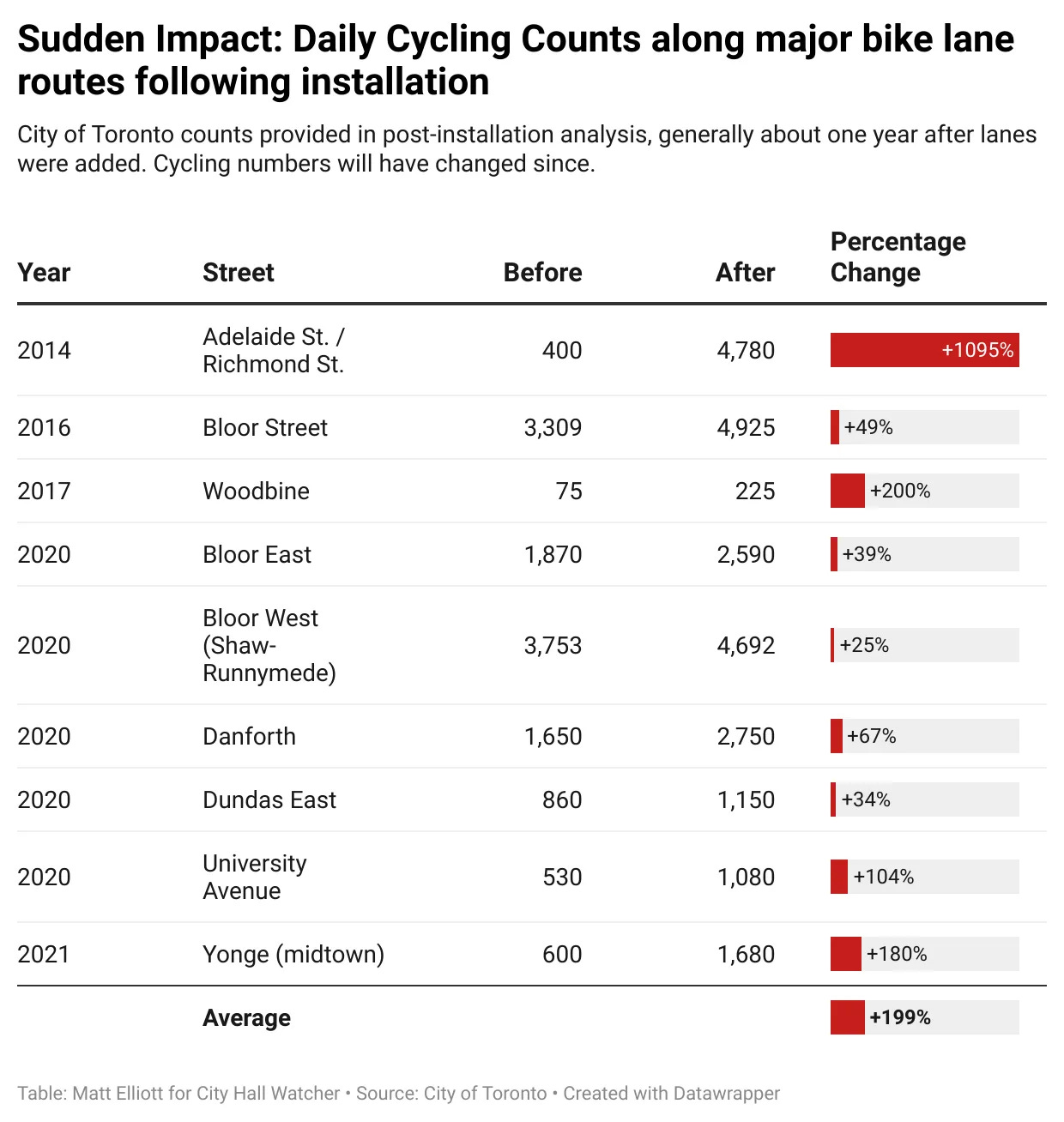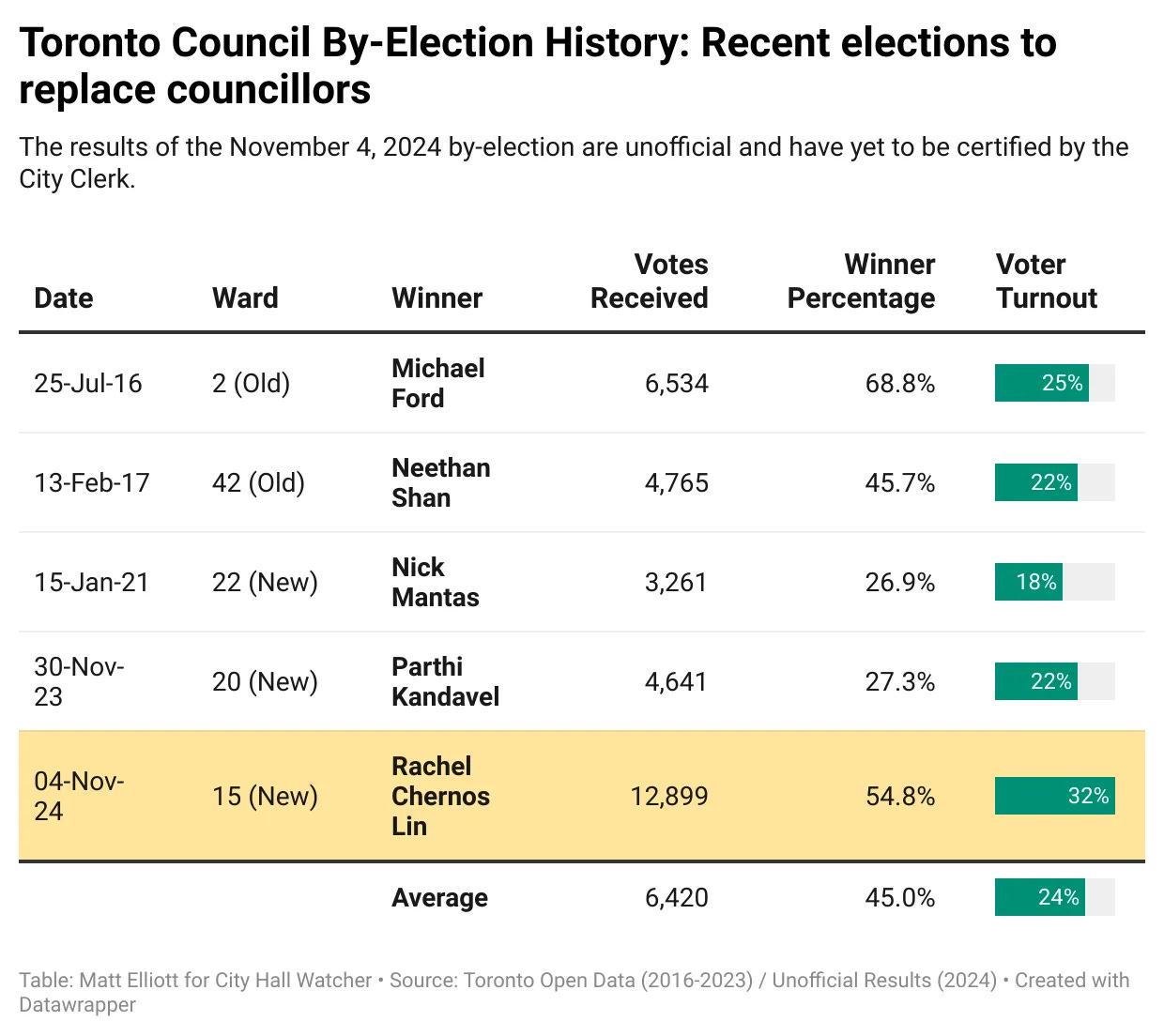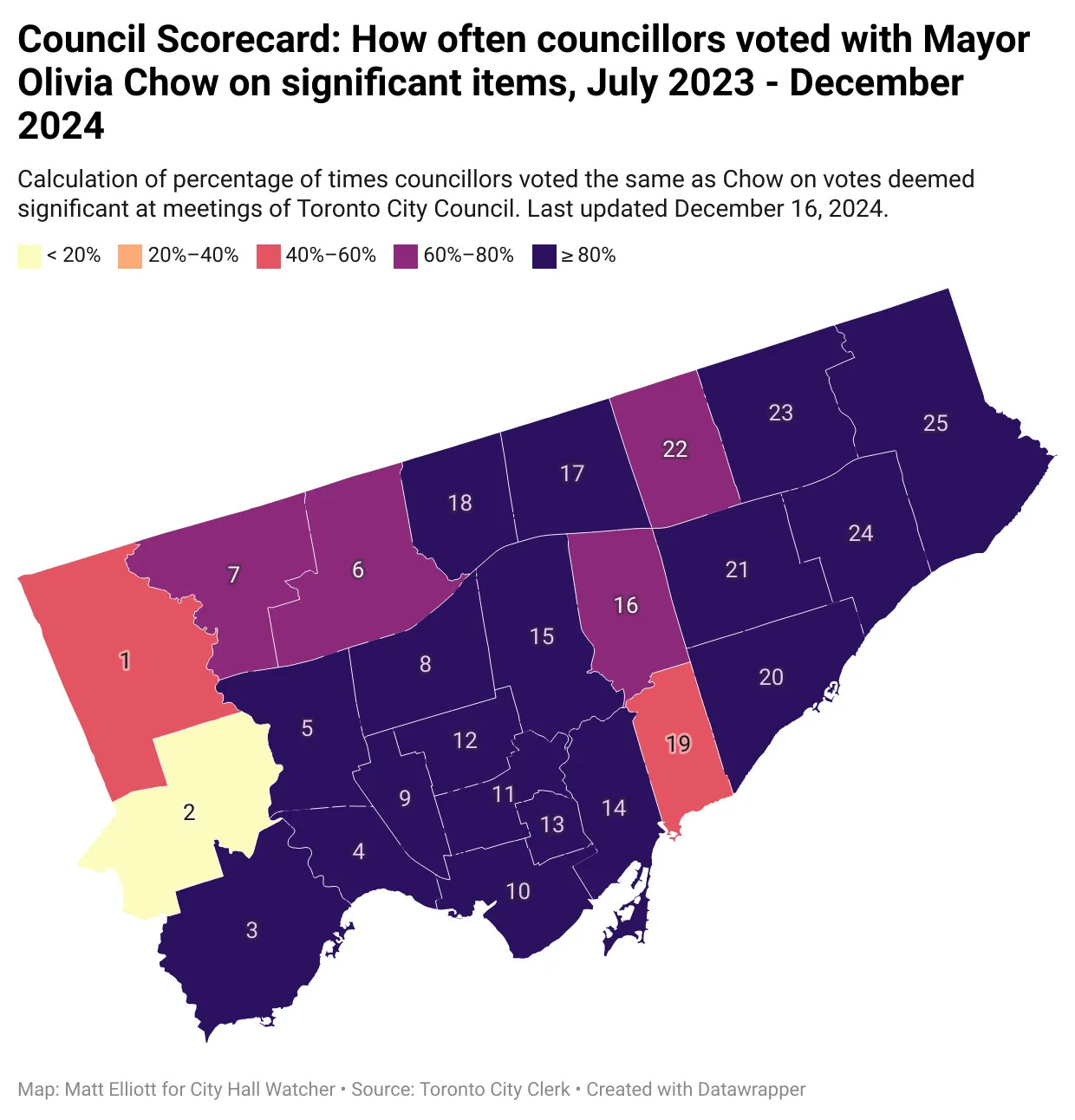2024: the year in charts
City Hall Watcher #312: A look back at the data and plots that moved municipal government this year
Happy Holidays! Hope they’re going well. Did you get what you asked for? Did you get what you need?
We may be through with 2024, but 2024 isn’t through with us. Not yet, anyway. Before we say goodbye, we simply must look back at the year through the lens of various charts about Toronto’s municipal government. It’s required by bylaw.
What follows is the sixth edition of City Hall Watcher’s annual Year in Charts — one chart from each month of the year in 2024.
Thank you for reading this newsletter all year. Here’s to more months, more years, more charts.
✨ There are lots of charts, so this issue runs long. You can also read it on the web.
— Matt Elliott
graphicmatt@gmail.com / Archives / Subscribe
2024: the year in charts
Previous years, in charts: 2019, 2020, 2021, 2022, 2023.
January
The year started with an interview with Mayor Olivia Chow where she recommended I take my toddler roller skating. Bold! Speaking of bold, Lobbyist Watch, always featuring lots of boldface names, looked at the busiest lobbyists in 2023. A 2024 update is in the works.
Also bold? The 2024 budget, which was introduced by staff in January with a proposed 10.5% residential property tax hike, and there was talk of taking it to as high as 16.5% if the federal government didn’t come through with funding for refugees in shelters. I talked to Budget Chief Councillor Shelley Carroll about what it would take to step back from the brink. Meanwhile, guest Damien Moule got very Dickensian in his analysis of the TTC’s capital spending.
My favourite piece of budget analysis, though, was my attempt to compare spending in the late 1990s with spending today on an inflation-adjusted per-capita basis.
February
The Budget (Olivia’s Version) was released, and saw a slight reduction in the planned property tax increase, dropping the number to 9.5%. Any worry of a 16.5% increase was erased after the federal government came to the table with promised shelter money, though the amount was — and seemingly still is — a bit of an open question.
Council’s focus on their $17 billion budget was briefly diverted by a debate over where the City should ban tobogganing at certain hills. Meanwhile, the Toronto Police made a giant lobbying and PR push to demand extra cash in the budget.
The mayor ultimately caved on the police budget. Council also devoted some extra funds to save the beloved suburban windrow-clearing program.
With the budget in the books, Council turned its attention to other issues, starting with hikes to parking fines. Also, Premier Doug Ford dropped by with a novelty cheque that definitely wouldn’t fit in an ATM.
March
Council learned that the cost of hosting matches as part of the World Cup in 2026 had gone up. Shocker. I killed time over March Break by diving deep into intersection traffic data, releasing a table of the data at hundreds of intersections. Some people take vacations. I make charts.
I also mapped a new year’s worth of 311 complaint data. People are still making lots of 311 calls about dead animals. There was also a treasure trove of data about the revenue (or lack of revenue) generated by Green P parking lots. And with a vacancy in the Chief Planner’s office, I wrote about the tough task for the next person to get the gig. (It took almost a year after this for City Hall to find someone new — former Hamilton planner Jason Thorne was announced as the new chief on December 6.)
April
I let the sunshine list in and made some charts. Council, meanwhile, had to deal with the fallout from a disastrous Year Two rollout of the Vacant Home Tax.
Trying new things with some trepidation, I had ChatGPT help me with some charts showing a concerning volume of City contracts awarded with just one bidder. I also challenged myself to dig into the data on the City’s fleet of vehicles in an attempt to answer the question of whether they have too many big trucks for the jobs they’re doing.
May
Based on Council expense records, I charted City Hall’s biggest road warriors — and biggest self-promotion spenders. Councillor Brad Bradford totes has a lot of tote bags.
I also charted the hourly rates for workers hired via City contracts, and found welders on the high end and security guards on the low end. Council kept busy by allowing six-storey buildings on major streets and banning e-scooters. And I can’t believe it took until May, but I finally made my first chart of 2024 about trees.
June
Lobbyist Watch took a surprising star-studded turn as Tessa Virtue and Morgan Rielly fought to win the right to paint their heritage home. It didn’t go well for them. Meanwhile, transit kept running as the TTC spared us a strike.
Guest contributor Damien Moule looked at what’s next for the EHON program. Turns out Toronto’s zoning laws are still kind of broken. An update to the Council Scorecard paid tribute to the late Jaye Robinson. And I found that while land transfer tax revenues were way down from the lofty heights of 2022, 2024 revenue hadn’t completely cratered. Not yet, anyway. I’m curious to see what the returns for the last few months of the year look like.
July
I recapped the June Council meeting, which included a basket’s worth of bike lane votes, and Lobbyist Watch revealed a by-election reunion as Ana Bailão met with the mayor to discuss the Quayside plan.
Before they could hit the beach, Council met (again) to discuss matters like the closure of the Science Centre and the need to speed up Gardiner construction.
And I charted just how darn long the sidewalks had been closed for the One Bloor building.
August
The Council Power Rankings had people mad at me, as is typical. Airport lobbying took off, as a fall debate on runway safety areas took shape.
I took some time off. Guest writer Damien Moule made some noise about a quiet idea for cycling infrastructure, while first-time contributor Hana Suckstorff called for some adjustments to the committee of adjustment. When I got back from vacation, it inspired me to make some charts about how often the CoA has rejected projects.
September
The seasons changed. Budget talk began. The police kicked things off with some talk of a staffing plan.
Intersection Inspection returned with a look at a major surge of pedestrian traffic on the waterfront. But Premier Doug Ford was suddenly talking about burying the 401?! Weird. It wouldn’t be his last bombshell proposal of 2024.
And I looked at some new data on construction procurement, where the timing just might be all kinds of wrong.
October
City Hall Watcher somehow, miraculously, celebrated its 300th issue. Thanks again. To mark the occasion (?), after enough lobbying to fill an airplane hanger, Council voted to compromise on the future of the Island Airport.
There was barely any room to unwind after that vote, though, because Premier Doug Ford started talking about legislation to restrict — and tear our — cycling infrastructure. It prompted a major fact check.
November
In the only election of significance that took place that month, Councillor Rachel Chernos Lin was elected to fill the vacancy in Don Valley West. Meanwhile, the bike lane fact-checking continued. So did the process to pass Premier Doug Ford’s bike lane bill, facts be damned. Still, armed with some fresh bike lane usage numbers, Council voted to oppose it.
In addition, the police budget continued to show signs of growth.
December
It looked as if Council would get yet another December debate about Uber licenses, but Mayor Olivia Chow backed off. Guest contributor Damien Moule returned (again) for a look at what really causes traffic. I was shocked to learn it wasn’t bike lanes.
Meanwhile, we got another dispiriting update on the SmartTrack plan and a chaotic Council meeting. Early Christmas gifts? Bah, humbug. And the final Council Scorecard of 2024 revealed the state of things heading into a brand new year.
More from Matt: on the need for cold weather fun on the Islands, and Mayor Olivia Chow’s long Christmas wish
📰 For the Toronto Star a couple of weeks back, I wrote about how the Toronto Islands — the city’s best collection of public spaces — is a relative ghost town in the winter. An expensive one. It would be nice to change that.
📰 Also for the Star, I wrote about my chat with Mayor Olivia Chow about her push to get a universal school food program in place.
It’s an initiative that dates back to December 24, 1990 — a Christmas wish she’d really like to make come true.
The week at Toronto City Hall
TUESDAY: 🏆 Bid Award Panel contract award of the week: $6.3 million for sewer odour control.
City Hall Watcher #312
And that’s another year in the books for City Hall Watcher. Thanks so much for reading. Here’s to another year of living in interesting times.


